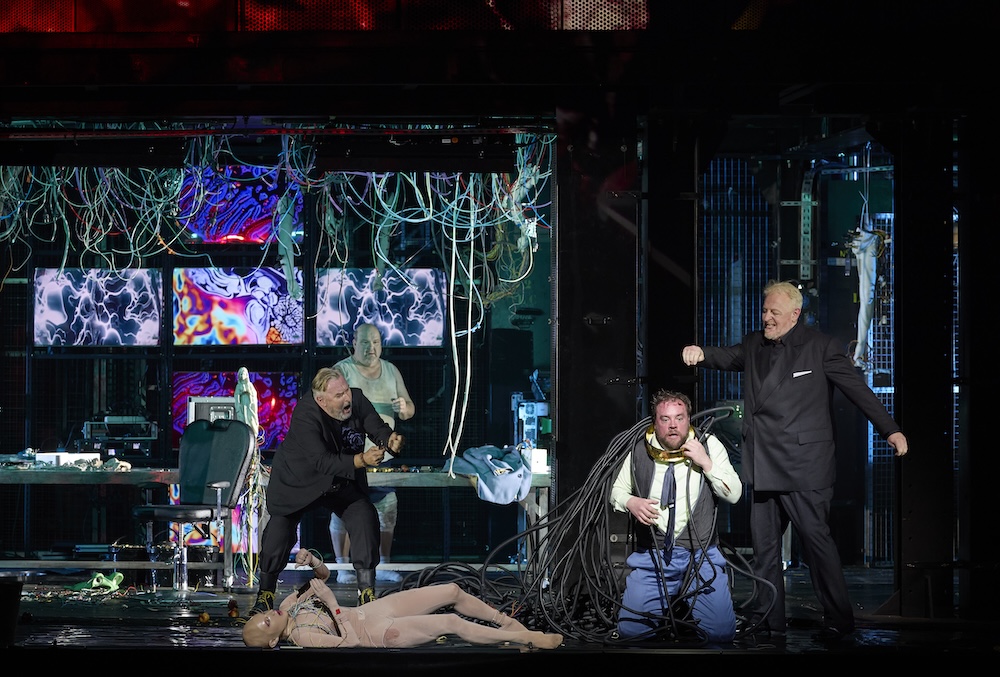Any Calixto Bieito production is news, but it is great big news when he takes on the first installment of opera’s notorious four opera cycle, Der Ring des Nibelungen. The best news is that his Rheingold can stand alone. It is a dramatic whole that requires no sequel.
It is vintage Bieito. His Rheingold equates the quest of wealth with man’s blatant sexual urges, and he does so without violating a word of Richard Wagner’s text, deepening our appreciation of Wagner’s Rheingold libretto and the entire Ring, while creating a riveting, two hour forty minute theater piece.
Spanish actor turned conductor Pablo Heras-Casado, as in his recent Bayreuth Parsifal, embellished the Wagnerian gesamtkunstwerk ideal with pacing that was measured in its urgency, vivid in its coloration of its Bieito’s sexual urges and overpowering in its resolutions. It began as we sat in the blackness of an extended nervous silence. Finally the whispers of the brass choir sounded to reveal Alberich alone on the stage, a cape of electrical conduit tubes (erotic pulses) on his back, playing with himself.
The massive stage expanse of the Opéra Bastille became covered with a reflective diaphanous cloth through which emerged the blue wetsuit-clad Rhine maidens, with oxygen tanks that somehow validated their purity (virginity). Alberich’s machinations soon dispelled this purity. Renouncing love Alberich walked off the stage dragging the protective cloth, revealing a metal wall that prevented Wotan from taking possession of his Valhalla.
The negotiations began, Fricka pounded her demands on the wall, the giants entered, Fasolt a business suited miniature, Fafner towered above in his old west, cowboy stud splendor, the very ripe Freia spilled a pail of apples, Wotan pinned Loge’s genitals to the floor with his staff, the maestro spewed forth the Ring’s electrifying fire music.

The loveless realm of the Nibelungens arose in tangled wires, Mime was a whiney, diapered baby, Alberich shouldered an inanimate sex doll (actually an animated dancer), and was summarily tricked by Loge. Wotan lusted for the gold and its captive force — a great big ring. Fricka, more than ever Lady Macbeth, looked on from above.
More brutal negotiations, Wotan wrenched the ring from Alberich and placed it around his own neck, a collar of subjugation to its power, the maestro’s brass choir howled. Loge had shed the dark glasses that confused power and sex, Fricka assumed the darkened spectacles in her blind compulsion of lust for Wotan’s power.
Erda saved the day, and the deal was done, Wotan took possession of Valhalla, its protective shield opened into a suspended drawbridge that led to a citadel illuminated by brilliant, hanging chandeliers orbs (testicles), the maestro found such massive volume that we knew that we had arrived at the profundity of attainment and its satisfaction. Wotan pulled his way up the scrambled electrical conduits (fire music) that served as steps to Valhalla, followed by Fricka, now secure in her complete possession of power. The final image was of a baby, an heroic progeny that would one day confront these same primal forces.
Though Loge had seen through Donner’s fog (that thickly enveloped us all) that there was probably an alternative outcome, this in quite clear and beautiful voice, the Rhine maidens in distant lament.
All of this is but the larger outline of this complex, visceral, highly amusing account of Das Rheingold — if I got it right. Or sort of. The program booklet informs us that Bieito’s Das Rheingold is a discussion of how artificial intelligence (AI) may influence our actions and relationships.

Many of the principal male singers were well versed in their roles on the world’s major stages — Scottish bass baritone Iain Paterson as Wotan (lead photo), New Zealand tenor Simon O’Neill as Loge, German tenor Gerhard Siegel as Mime, and Finnish bass Mika Kares as Fafner. Of great interest was Korean bass Kwangchul Youn as a big and beautifully voiced Fasolt in his distinctly diminutive form for a Wagner’s giant. American baritone Brian Mulligan made a squeamish Alberich, rather than finding the role’s more usual brutal, evil presence. Donner was sung by French baritone Florent Mbia, a member of Paris Opera’s young artist program, and Froh was sung by Canadian tenor Matthew Cairns, a former member of the New York’s Metropolitan Opera’s young artist program.
Of great interest was the Fricka of Eve-Maud Hubeaux, a Swiss mezzo from Geneva who traverses the absolute gamut of the mezzo repertoire on the world’s major stages. Of huge presence and big, rich voice she brings energy and wit to her roles, making us yearn to know how Fricka may play out in a future Bieito Die Walküre. Freia was sung by New Zealand born, British finished soprano Eliza Bohm, who brought requisite shape to ripe sexuality. Erde was perfunctorily portrayed by French mezzo soprano Marie-Nicole Lemieux. The Rhine maidens were Isabel Signoret, Katharina Magiera and Juliette Morel.
Rebecca Ringst (sets) and Ingo Krügler (costumes) and Bettina Auer (dramaturgy) are long time collaborators with Callisto Bieito. Lighting was by Michael Bauer.
Michael Milenski
Opéra Bastille, Paris, France, February 11, 2025.
All photos copyright Herwig Prammer, courtesy of the Opéra national de Paris